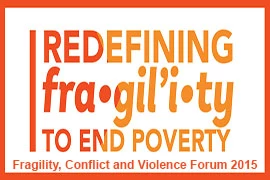Drug smuggling and human trafficking, money laundering, the illegal exploitation of natural resources and wildlife, the sale of fraudulent medicines or counterfeit goods: They're all criminal activities – and they're all highly lucrative.
As documented by the World Development Report 2011, these threats impede economic development, and Fragile and Conflict-Affected States (FCS) are especially vulnerable. In FCS situations – where countries have been devastated by war, are suffering from weak state security, or are enduring severe economic hardship – criminal networks operate with ease, using corruption and intimidation to undermine the integrity of public officials, institutions and the rule of law. Illegal activity often ends up undermining the state’s capacity to deliver even basic services. The far-reaching impact of such lawbreaking was recently explored at a panel – “Exploring the Link Between Fragility and Criminal Activity” – that was part of the World Bank’s “Fragility, Conflict and Violence Forum 2015.”
The diversion of assets toward illegal activities drains away resources and tax revenues that are needed for urgent human needs and vital civic priorities. Such a siphoning-off of scarce funds undermines governments' integrity and infects countries' investment climate – factors that are indispensable to creating jobs, boosting growth and building shared prosperity. This is an even greater danger in FCS countries, where trust in institutions is already impaired, and where lawbreaking can intensify popular grievances and provoke further violence.
A wide range of tools are available to practitioners seeking to address the scourge of criminal activity, helping them stem the illicit financial flows related to crime. On the prevention side, one example is the Extractive Industries Transparency Initiative in Nigeria, which shows how increased contract transparency in the extractives sector has worked as a remedy. On the enforcement side, there are also criminal-justice mechanisms, like “follow the money” tools that can help trace and recover the proceeds of crime. Improved domestic and international cooperation can also help to combat criminal activities and their furtive flows of funds.
The need to fight illicit financial flows has become a worldwide policy priority, with leaders of the G20 and G8 nations now fully engaged in the crackdown on crime. The World Bank Group, for our part, has focused several of our Global Practices and specialized units – our practice groups on Governance, Finance and Markets, Trade and Competitiveness, and Energy and Extractive Industries, along with our Stolen Asset Recovery (StAR) Initiative – on promoting coordinated action to fight criminal activities and illicit flows of funds.
Efforts to ensure honesty, transparency, accountability and the rule of law help strengthen all aspects of the development process, and they are particularly important in FCS conditions. Understanding criminal activities in FCS situations, and asserting potential remedies, helps promote a clearer vision of the steps that can be taken to reduce transnational crime and to focus the full measure of the world's resources on achieving development impact.



Join the Conversation